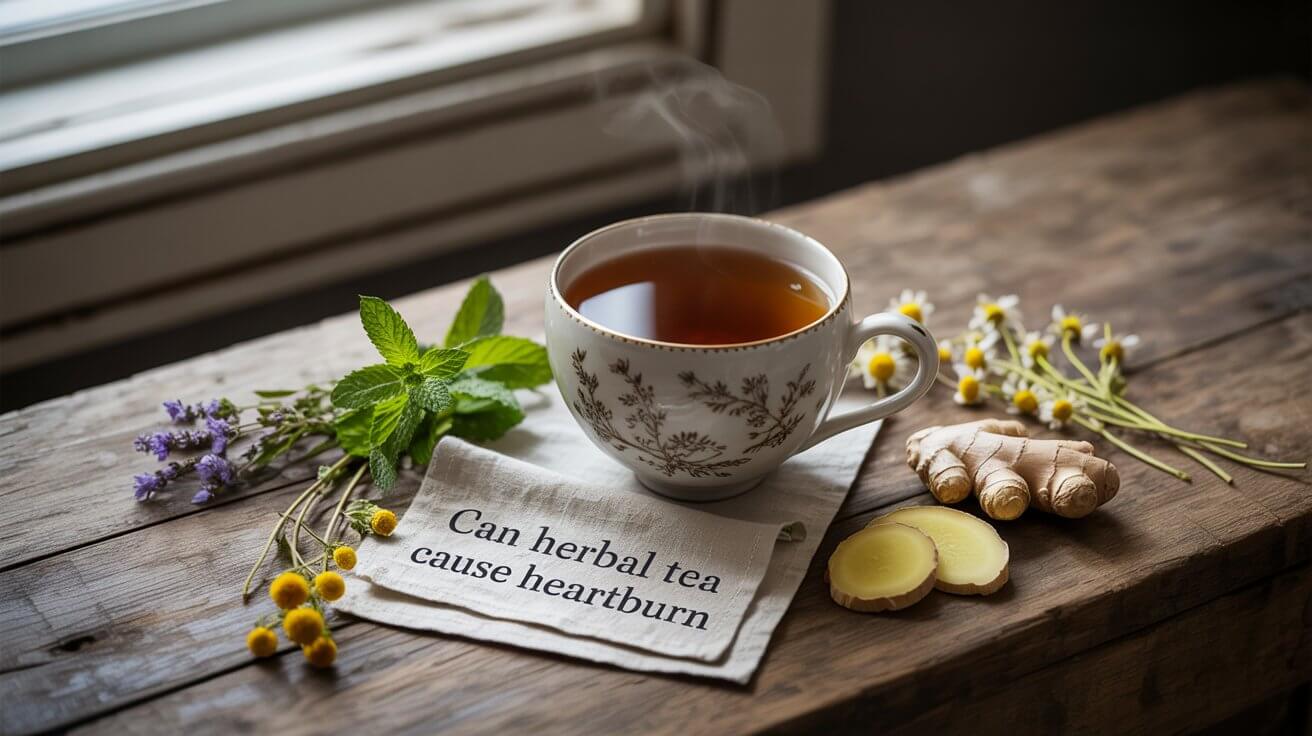Herbal tea is one of the most beloved wellness drinks in the world soothing, caffeine-free, and packed with natural benefits. From chamomile and rooibos to ginger and peppermint, these teas are often seen as gentler alternatives to coffee or black tea.
But here’s the twist: while herbal teas are usually calming, some blends can actually trigger heartburn or acid reflux especially if you’re sensitive to certain herbs.
In this updated 2025 guide, we’ll explore why some herbal teas cause heartburn, which blends are safe and soothing, and how to enjoy your tea without discomfort.
If you’re looking for teas that support digestion and metabolism without irritation, explore our handpicked blends on the All Day Slimming Tea Blog.
What Exactly Is Heartburn?
Heartburn is a burning sensation in your chest or throat, caused when stomach acid backs up into the esophagus. This happens if the lower esophageal sphincter (LES) the valve that keeps acid in your stomach relaxes too much or weakens.
Common triggers include spicy foods, caffeine, alcohol, chocolate, and yes in some cases, certain herbal teas.
Occasional heartburn is normal, but frequent symptoms may signal GERD (Gastroesophageal Reflux Disease) or another digestive issue that should be checked by a doctor.
Can Herbal Tea Really Cause Heartburn?
Yes but it depends on which tea you drink and how your body reacts.
Some herbs are naturally relaxing great for stress relief but not so great for your esophagus. When they relax the LES muscle too much, stomach acid can escape upward, causing that familiar burning sensation.
Common Culprits Include:
-
Peppermint & Spearmint Tea: Though often marketed for digestion, mint can worsen acid reflux in sensitive individuals by relaxing the LES.
-
Hibiscus Tea: Its tart, acidic profile can irritate the stomach lining.
-
Citrus-Based Herbal Blends: Lemon, orange peel, and other acidic ingredients can increase reflux symptoms.
Why Some People Get Heartburn and Others Don’t
Everyone’s digestive system reacts differently to herbal teas. Factors include:
-
Ingredient Sensitivity: Some people are more reactive to specific herbs.
-
Existing Digestive Issues: Those with GERD, gastritis, or ulcers are more likely to experience irritation.
-
Concentration and Serving Size: Strong brews or oversized mugs can increase acid production.
-
Timing: Drinking tea on an empty stomach can sometimes worsen reflux.
Even within a family, one person may sip peppermint tea happily while another feels heartburn within minutes.
Herbal Teas Less Likely to Cause Heartburn
You don’t have to give up your tea habit! Many herbal teas are naturally soothing and gentle on the stomach:
| Tea Type | Digestive Benefits | Notes |
|---|---|---|
| Chamomile Tea | Calms the stomach and reduces inflammation | Ideal before bedtime |
| Rooibos Tea | Caffeine-free, low in tannins, rich in antioxidants | Very gentle on digestion |
| Ginger Tea | Aids digestion and reduces nausea | Avoid very strong brews |
| Licorice Root Tea (DGL) | Coats and protects stomach lining | Choose deglycyrrhizinated version to avoid BP issues |
| All Day Slimming Tea | Supports digestion and fat metabolism with gentle herbs | Balanced for daily use |
These teas can help you maintain your wellness routine without triggering reflux especially when brewed lightly and enjoyed after meals.
Tips to Enjoy Herbal Tea Without Heartburn
If herbal tea has ever caused discomfort, try these science-backed adjustments:
-
Drink Smaller Portions – Instead of a large mug, enjoy half a cup at a time.
-
Avoid Empty Stomach Sipping – Have a small snack first to buffer acidity.
-
Shorten Steep Time – Over-steeping releases stronger compounds that may irritate.
-
Choose Low-Acid Blends – Go for caffeine-free, neutral teas like rooibos or chamomile.
-
Track Your Triggers – Note which ingredients cause flare-ups so you can avoid them.
-
Stay Upright After Drinking – Avoid lying down immediately after tea time.
Consistent, mindful drinking habits can make all the difference for sensitive stomachs.
When to See a Doctor
Occasional heartburn isn’t alarming, but persistent reflux (more than twice a week) could indicate GERD or another digestive condition.
If symptoms like chest pain, nausea, or regurgitation continue, talk to a healthcare provider. They may recommend lifestyle changes or further testing to identify the root cause.
Final Thoughts: Herbal Tea and Heartburn Balance is Key
So, can herbal tea cause heartburn?
Yes in some cases, especially with mint, hibiscus, or citrus teas.
But with the right blend, mindful portioning, and gentle brewing, you can still enjoy your favorite teas without discomfort.
For those looking to sip smarter, check out the All Day Slimming Tea Blog featuring blends that balance digestion, hydration, and fat metabolism while being kind to sensitive stomachs.


Leave a Reply